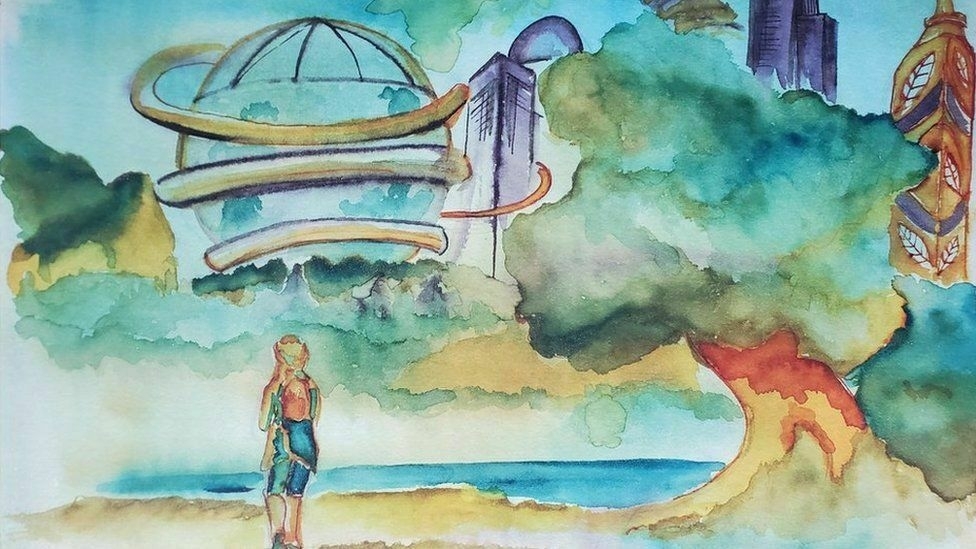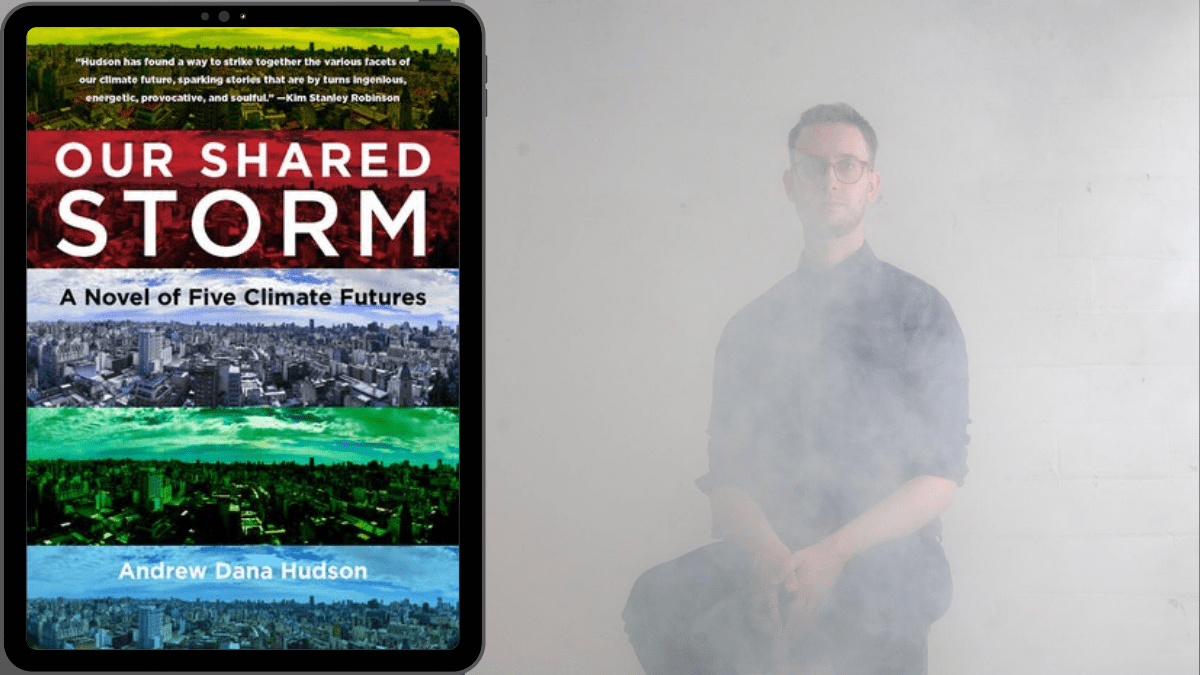- Solarpunk: Notes toward a manifesto (Hieroglyph)
- Plans for $400-billion new city in the American desert unveiled (CNN Style)
- Jeff Bezos and the New Pharaohs (Singularity Weekly)
- Are we on the road to civilisation collapse? (BBC Future) — "Collapse is often quick and greatness provides no immunity. The Roman Empire covered 4.4 million sq km (1.9 million sq miles) in 390. Five years later, it had plummeted to 2 million sq km (770,000 sq miles). By 476, the empire’s reach was zero."
- Fish farming could be the center of a future food system (Fast Company) — "Aquaculture has been shown to have 10% of the greenhouse gas emissions of beef when it’s done well, and 50% of the feed usage per unit of production as beef"
- The global internet is disintegrating. What comes next? (BBC FutureNow) — "A separate internet for some, Facebook-mediated sovereignty for others: whether the information borders are drawn up by individual countries, coalitions, or global internet platforms, one thing is clear – the open internet that its early creators dreamed of is already gone."
The casual ableism of futurism
This article by Janet Gunter discusses the endemic ableism she’s discovered due to her new and invisible disability (Long Covid). As a technologist and anthropologist, she notes that even progressive futurist notions such as solarpunk are problematic for people like her who rely on complex supply chains.
We need to do better to understand that a future that doesn’t work for us all is, as Janet points out, exclusionary and essentially a form of fascism.
<img class=“alignnone size-full wp-image-8827” src=“https://thoughtshrapnel.com/wp-content/uploads/2023/10/DALL·E-2023-10-24-20.15.19-Photo-of-a-circular-wooden-cabin-in-a-serene-forest-setting.-Inside-a-person-who-appears-tired-and-fatigued-is-resting-on-a-tatami-mat-taking-a-mome-1.png” alt=“DALL-E: Photo of a circular wooden cabin in a serene forest setting. Inside, a person who appears tired and fatigued is resting on a tatami mat, taking a moment to rejuvenate. The cabin’s large round windows offer panoramic views of the dense trees and distant mountains, while the interior showcases Japanese minimalism with sliding paper doors and a central meditation space.
" width=“1024” height=“1024” />
Scanning back to scifi of my childhood, the only disabled character in Starwars was Darth Vader. And Vader is a perfect posterboy for the usual scifi treatment of disability – a canvas for creepy transhumanist visions of “fixing” the disabled and the hiding of disability. (It turns out, now, there are rare good depictions of the disabled in scifi, but you have to know where to look!)Source: Crip futurism | Janet GunterOthers have observed that ignoring or devaluing the concerns of the most vulnerable — or suggesting that they get fixed or deleted from a future green society — is tantamount to ecofascism.
[…]
What the ableist world needs now is acceptance of cataclysmic change and all of the grief that comes with that. Acceptance that our Cartesian minds will destroy us, that we need to learn to listen to our bodies and to the biosphere. Acceptance that the pace of our lives must change.
Personally, I desperately need visions of the future where I can be an active, valued participant, no matter my physical or cognitive state. I need everybody involved in envisioning and testing new ways of living within our planetary boundaries to consider and include people like me at the outset, not as an after-thought.
Image: generated with DALL-E 3
Solarpunk and five climate futures
In this interview with Andrew Dana Hudson, he lays out a brief overview of the five futures he discusses in his book. This, in turn, is based on his Masters thesis.
There’s a lot of optimism in solarpunk approaches to the future, which is attractive. We just need to have the will to realise that it’s not already over.
There is a very optimistic sustainable scenario, full of community and open-hearted kindness and capitalist power fading to a bad memory. But there’s also a scenario of overclocked consumerism, another of neo-feudal inequality, and a third of persistent military conflict and global breakdown. And a middle-of-the-road scenario in which, like today, we slowly make some progress but never, ever enough.Source: Our Shared Storm: An Interview with Andrew Dana Hudson – Solarpunk Magazine[…]
Solarpunk also seems to me a bridge toward a future of energy abundance. It’s funny, given how much solarpunk is (wonderfully) influenced by crusty degrowthers and permacultural downshifters, but it’s possible that if we keep building renewables the way we’re projected to over the next decade or so, we might end up with access to way more energy than human beings have ever had to work with (at least during the day). What do we do with that? Those electrons have to go somewhere. Well, we’ll need a lot of energy to remove a Lake Michigan’s worth of carbon out of the atmosphere, in order to stabilize the climate and roll back ocean acidification. Call that Big Chemistry. But probably there’s room for Big Computation and Big Culture as well. If solar energy becomes cheaper than free, how does that broaden our artistic ambitions? And what does that sometimes-post-scarcity mindset mean for how we treat each other?
Microcast #094 — Solarpunk vs technocratic pharaohs
Overview
A thematic look at sustainable futures, from equitable approaches to chimeric fetuses and phallic spaceships.
Show notes
See also: Bright green, blight green, and lean green futures (Open Thinkering)
Image: Solarpunk Flag by @Starwall@radical.town
Background music: Shimmers by Synth Soundscapes (aka Mentat)
What is 'solarpunk'?
I've seen people on the Fediverse, including people I know and have worked with, describe themselves as 'solarpunks'. It seems like the approach is becoming more mainstream, which is no bad thing.

Lush green communities with roof top gardens, floating villages, transport fuelled by clean energy and hope-filled sci-fi tales. Imagine a world in which existing technologies are deployed for the greater good of both people and the planet.
It's called solarpunk. The term, coined in 2008, refers to an art movement which broadly envisions how the future might look if we lived in harmony with nature in a sustainable and egalitarian world.
"Solarpunk is really the only solution to the existential corner of climate disaster we have backed ourselves into as a species," says Michelle Tulumello, a solarpunk art teacher in New York state.
"If we wish to survive and keep some of the things we care about on the earth with us, it involves a necessary fundamental alteration in our world view where we change our outlook completely from competitive to cooperative."
Source: What is solarpunk and can it help save the planet? | BBC News
One can see only what one has already seen
Fernando Pessoa with today's quotation-as-title. He's best known for The Book of Disquiet which he called "a factless autobiography". It's... odd. Here's a sample:
Whether or not they exist, we're slaves to the gods.
Fernando pessoa
I've been reading a lot of Seneca recently, who famously said:
Life is divided into three periods, past, present and future. Of these, the present is short, the future is doubtful, the past is certain.
Seneca
The trouble is, we try and predict the future in order to control the future. Some people have a good track record in this, partly because they are involved in shaping things in the present. Other people have a vested interest in trying to get the world to bend to their ideology.
In an article for WIRED, Joi Ito, Director of the MIT Media Lab writes about 'extended intelligence' being the future rather than AI:
The notion of singularity – which includes the idea that AI will supercede humans with its exponential growth, making everything we humans have done and will do insignificant – is a religion created mostly by people who have designed and successfully deployed computation to solve problems previously considered impossibly complex for machines.
Joi Ito
It's a useful counter-balance to those banging the AI drum and talking about the coming jobs apocalypse.
After talking about 'S curves' and adaptive systems, Ito explains that:
Instead of thinking about machine intelligence in terms of humans vs machines, we should consider the system that integrates humans and machines – not artificial intelligence but extended intelligence. Instead of trying to control or design or even understand systems, it is more important to design systems that participate as responsible, aware and robust elements of even more complex systems.
Joi Ito
I haven't had a chance to read it yet, but I'm looking forward to seeing some of the ideas put forward in The Weight of Light: a collection of solar futures (which is free to download in multiple formats). We need to stop listening solely to rich white guys proclaiming the Silicon Valley narrative of 'disruption'. There are many other, much more collaborative and egalitarian, ways of thinking about and designing for the future.
This collection was inspired by a simple question: what would a world powered entirely by solar energy look like? In part, this question is about the materiality of solar energy—about where people will choose to put all the solar panels needed to power the global economy. It’s also about how people will rearrange their lives, values, relationships, markets, and politics around photovoltaic technologies. The political theorist and historian Timothy Mitchell argues that our current societies are carbon democracies, societies wrapped around the technologies, systems, and logics of oil.What will it be like, instead, to live in the photon societies of the future?
The Weight of Light: a collection of solar futures
We create the future, it doesn't just happen to us. My concern is that we don't recognise the signs that we're in the last days. Someone shared this quotation from the philosopher Kierkegaard recently, and I think it describes where we're at pretty well:
A fire broke out backstage in a theatre. The clown came out to warn the public; they thought it was a joke and applauded. He repeated it; the acclaim was even greater. I think that's just how the world will come to an end: to general applause from wits who believe it's a joke.
Søren Kierkegaard
Let's home we collectively wake up before it's too late.
Also check out:
